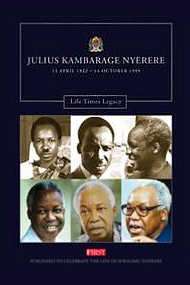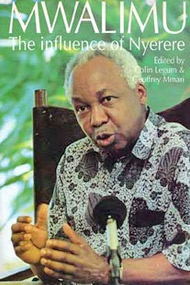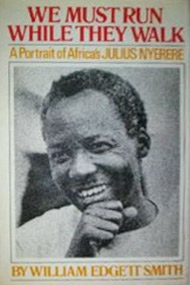Press Coverage from the Internet on Nyerere’s Death
Press Coverage from the Internet. By date. By newspaper. Julius Nyerere 1. 14 October 1999 6. ANC Statement On The Death Of Julius Kambarage "Mwalimu"
Press Coverage from the Internet. By date. By newspaper. Julius Nyerere 1. 14 October 1999 6. ANC Statement On The Death Of Julius Kambarage "Mwalimu"
In 1966 Julius Kambarage Nyerere was President of the Republic of Tanzania. When President Kenneth Kaunda of neighboring Zambia became the first Chancellor of the University of Zambia when it was inaugurated on July 13, 1966 he invited Nyerere, also the Chancellor of the University of East Africa, to attend the ceremony and give an address to the assembled audience. President Nyerere used the occasion to describe the possible conflict between African nationalisms and Pan-Africanism.
Your Excellencies, we have achieved many things in Africa in recent years, and can look back with some pride at the distance we have travelled. But we are a long way from achieving the thing we originally set out to achieve, and I believe there is a danger that we might now voluntarily surrender our greatest dream of all.
For it was as Africans that we dreamed of freedom; and we thought of it for Africa. Our real ambition was African freedom and African government. The fact that we fought are by area was merely a tactical necessity. We organized ourselves into the Convention People's Party, the Tanganyika African National Union, the United National Independence Party, and so on, simply because each local colonial government had to be dealt with separately.
The question we now have to answer is whether Africa shall maintain this internal separation as we defeat colonialism, or whether our earlier proud boast—’I am an African’—shall…

Life Times Legacy
Published to celebrate the life of Mwalimu Nyerere.
Julius Kamberage Nyerere (born 1922) was a Tanzanian statesman and political philosopher who became the first president of Tanzania. His carefully reasoned and well-presented policies for the development of Tanzania led to a reputation as Africa's most original thinker.
HE Mwanaidi Sinare Maajar
Tanzania High Commissioner to the United Kingdom
Introduction - nyerere_lifetime_legacy_ms_maajar_intro.pdf
Benjamine William Mkapa
Third President of the United Republic of Tanzania
Memories of Julius Nyerere - nyerere_lifetime_legacy_mkapa.pdf
Ali Hassan Mwinyi
Second President of the United Republic of Tanzania
Mwalimu Nyerere as i knew him - nyerere_lifetime_legacy_hon_mwinyi.pdf
Joaquim Alberto Chrissano
Former President of Mozambique
Beloved son of Africa - nyerere_lifetime_legacy_joaquim_chissano.pdf
Dr Salim Ahmed Salim
Chairman…
International high level conference on mwalimu julius.kambarage nyerere to be held at the university of edinburgh, scotland 9th -12t of november, 2009.
FOR IMMEDIATE RELEASE PRLog (Press Release) - Nov 08, 2009 - JULIUS. K .NYERERE UNSUNG HERO OF AFRICA WHO MADE NELSON MANDELA
Edinburgh, United Kingdom, November 6, 2009
Today the world knows a lot about President Nelson Mandela but seemingly conveniently always forgetting that Mwalimu Julius Kambarage Nyerere, a late Tanzanian President was a man behind Mandela Success. Without Nyerere effort's we probably would have had the Mandela's success story as we have it today, as presented to the world. Let me walk you down the history lane to refresh our recollection. In 1959 Mwalimu Nyerere together with Archbishop Trevor Huddleston, founded the Anti-Apartheid Movement in Britain.
In 1980s during the campaign for South Africa Nuclear Disarmament, the movement had individual membership of 6,000 people, and attracted 700 organizations, including the Labour, Liberal and Social Democratic parties affiliated. These together represented more than 18 million people. This implies that whatever success Mandela is afforded it was because of Mwalimu Nyerere's high involvement which made it happen. In sum Tanzania could have had a better economy today if it did not accept sacrifices in building the future and freedom fighting for the region of southern Africa. Mwalimu Nyerere was true to…

Author, Editor: Colin Legum
Editor: G. R. V. Mmari
Paperback: 205 pages
Publisher: Africa World Press (February 1995)
Language: English
ISBN-10: 0865434794
ISBN-13: 978-0865434790
Dimensions: 9.1 x 6 x 0.7 inches
Book Description
In this text, international figures such as Father Huddleston and Sir Shridath Ramphal join with Tanzanian scholars to assess, not without criticism, the influential contributions of Julius Nyerere both within his own country and across the Third World. Part 1 provides an overview of the man and his thought. Part 2 focuses on those areas of policy in which Nyerere took a particular interest.
Part 3 concentrates on the major social, economic and political issues that have been central to the unique Tanzanian experience - unique because of the man who shaped the first quarter of a century of independence. North America: Africa World Press; Tanzania: Mkuki na Nyota --This text refers to an alternate Paperback edition.

Author: William Edgett Smith
Loose Leaf: 296 pages
Publisher: Random House; 1st edition (1972)
Language: English
ISBN-10: 0394467523
ISBN-13: 978-0394467528
Book Description:
This book is, as its title would indicate, more of a personal memoir than apolitical analysis.It is also clearly written for the general American reading public, whose knowledge of Africa comes largely from Robert Ruark and M.G.M. The reader must strive to keep these points in mind when assessing its usefulness. William Edgett Smith is a hopeless and incurable Tanzaphiliac.
Five years ago this disease rampaged unchecked through thr pages of journals and the proceeding of conferences. An earl diagnosis by Ali Mazrui in Transition (1967) appears to have been accurate, for as the great expatriate enthusiast have gradually departed, the virus of Tanzaphilia seems to be disappearing.
"Without any question, the manner and the implications of the union between Tanganyika and Zanzibar is the most misunderstood aspect of Tanzania's political development. It may not matter very much when foreigners get confused, but unfortunately there are many times when Tanzanians themselves appear to misunderstand it."
Former Tanzanian President Julius Nyerere. - Dar es Salaam Government Printer, July 1970. p. 3.
INTRODUCTION
When the former Tanzanian President Julius Kambarage Nyerere made the above address to his National Assembly that "the union between Zanzibar and Tanganyika is the most misunderstood aspects of Tanzanian's political development" proved that he is the only Tanzanian who knows "the manner and the implications of the union" after British colonialism in East Africa.
During the British colonialism, Zanzibar was the only intellectual center for Islamization of East African countries under the Zanzibar Sultanate. The Gofu and the Barza Mosques allowed students from the East African countries for the Islamic education. The Zanzibar Muslim Academy also offered the greatest hope for the vibrancy of Islam in East Africa. Nyerere, a devout Catholic saw that the Islamic Zanzibar state, a threat to Christianity. He masterminded a clandestine movement for the so called Zanzibar Revolution under the leadership of John Okello, a radical Christian from Uganda. It was not only a prelude to the…